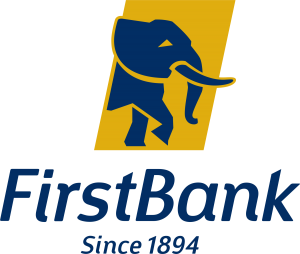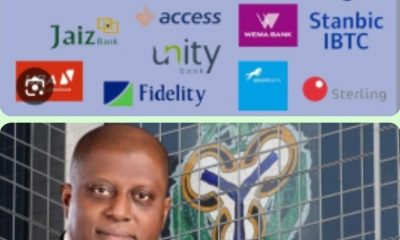Business
FIRSTBANK EXPOSURE TO HERITAGE BANK HAS BEEN SETTLED

The Nigeria Deposit Insurance Corporation (NDIC) yesterday announced the
commencement of the liquidation of the defunct Heritage Bank Plc, following the
revocation of its operating licence by the Central Bank of Nigeria (CBN).
The corporation said the move was in accordance with Section 55 sub-section 1 and 2
of the NDIC Act 2023, adding that depositors of the defunct bank that have alternate
accounts within the industry would be paid up to the insured amount of N5 million per
depositor using their Bank Verification Number (BVN) to locate their alternate account.
In a statement, NDIC Director, Communication and Public Affairs, Bashir Nuhu, said that
the liquidation process was with immediate verification and payment of insured deposits
to the bank depositors.
He said depositors with funds more than N5 million would be paid liquidation dividend
upon realisation of the bank’s assets and recovery of debts owed to Heritage Bank.
The revocation is coming on the revelation that FirstBank’s total exposure to Heritage
bank amounted to about N500 billion.
The CBN under former Central Bank Governor, Godwin Emefiele, got FirstBank to
support Heritage Bank at the level of forbearance, clearing of their checks and
instruments. “This led to their massive indebtedness to FirstBank to the tune of N500
billion,” a source with knowledge of the matter revealed.
THISDAY reliably learned last night that before the announcement of the revocation of
Heritage Bank’s licence was made, CBN paid off First Bank’s exposure to Heritage.
Since its intervention was at the behest of the apex bank under Emefiele.
The NDIC further advised all depositors of the defunct bank without alternate bank
account in the industry to visit the nearest branch of the bank with proof of account
ownership, verifiable means of identification such as driver’s licence, permanent voter’s
card, national identity card, together with their alternate account and BVN for the
verification of their deposits and subsequent payment of insured sums.
Nuhu, also the bank’s creditors to visit the nearest branch of the bank to file their claims
or via the online platform, adding that the process of payment of creditors would
commence immediately after all depositors have been paid.
He also advised debtors that are yet to complete the repayment of loans to contact the
corporation’s Asset Management Department (AMD) or visit the NDIC website for more
details.
The NDIC however, assured the entire banking public of its commitment to the
continued safety of depositors’ funds in all licensed banks.
It therefore, urged depositors to continue their banking businesses without fear as
banks whose licenses have not been revoked remain safe and sound.
The CBN had earlier announced the revocation of the operating licence of the failed
bank with immediate effect.
In a statement issued by CBN acting Director, Corporate Communications, Mrs.
Hakama Sidi Ali, the apex bank said the move was in accordance with its mandate to
promote a sound financial system in Nigeria and in exercise of its powers under Section
12 (1l of the Banks and Other Financial Act (BOFIA) 2020.
The central bank pointed out that the Board and management of the bank had not been
able to improve the bank’s financial performance, a situation which constitutes a threat
to financial stability.
This followed a period during which the CBN engaged with the bank and prescribed
various supervisory steps intended to stem the decline.
Sidi Ali said, “Regrettably, the bank has continued to suffer and has no reasonable
prospects of recovery, thereby making the revocation of the license the next necessary
step.”
Specifically, the CBN said the action became necessary due to the bank’s breach of
Section 12 (1) of BOFIA, 2020.
The CBN acting director further explained that the central bank took the action to
strengthen public confidence in the banking system and ensure that the soundness of
the financial system was not impaired.
She said the NDIC had also been appointed as the liquidator of the distressed bank in
accordance with Section 12 (2) of BOFIA, 2020.
She explained, “We wish to assure the public that the Nigerian financial system remains
on a solid footing.
“The action we are taking today reflects our continued commitment to take all necessary
steps to ensure the safety and soundness of our financial system.”
However, reacting to the licence revocation by the CBN, Founder/Chief Executive
Officer of Proshare Nigeria Limited, Mr. Olufemi Awoyemi, argued that at least four other
banks “are in situations requiring swift CBN intervention; therefore, the #CBN and the
#NDIC will have to shift regulatory/intervention gear sticks to ensure that the banking
system works with minimal disruption.”
He pointed out that the revocation of Heritage Bank’s licence did not come as a
surprise.
“For a bank under forbearance, this was a long time coming (as we recall the number of
reports on same and challenges with similar entities under the same program), given
the numerous follow-ups done by Proshare.
“Neither the CBN nor NDIC took to Proshare’s recommendations; with the wheels now
turning full circle with the CBN’s recent decision to liquidate Heritage Bank, the crackling
of regulatory noise has been tuned up. Therefore, we remain unsurprised and ask why it
took so long for the regulators (CBN and NDIC) to see the merit in the
recommendations proffered,” he added.
According to him, almost five years after, and sequel to the multiple interventions by the
CBN, including its forbearance position, nothing changed.
“Eventually, it would appear that the CBN took the first option we proposed. The action
today compels the need to interrogate the institutional decision-making capacity and
capability in the face of the obvious financial system and organisation shortcomings,”
Awoyemi said.
Also, Head, Financial Institutions Ratings at Agusto & Co, Mr. Ayokunle Olubunmi said,
“Heritage Bank has been struggling for a while now. The bank’s capital has been
persistently below the CBN minimum threshold.
“I believe that the revocation is meant to send a message to the banks that the CBN will
not hesitate to revoke the licence of any bank in breach of the CBN regulations. It could
also sanitise the banking industry to an extent.”
He noted that the revocation could improve confidence in the financial system since the
banks know that their licences could be withdrawn and would have to comply with the
various regulations.
Olubunmi, further stressed that the recent increase in the NDIC coverage would provide
some comfort to depositors.
Also, a banker who pleaded anonymity said the distressed bank had not reported their
financials in five years, adding that he perceived two other banks have negative capital
and bad financials which may go the route of license revocation.
The source said, “Heritage Bank had not produced their financials for years and over
the years there had been various investors that had tried to acquire the bank but once
they did their due diligence they backed out. Things have been so bad that they don’t
have senior staff for certain pertinent positions such as Chief Risk Officer and Treasurer.
So, things have been bad in the bank for a while.”
Culled from ThisDay
Business
Nigeria’s Inflation Drops to 15.10% as NBS Reports Deflationary Trend

Nigeria’s headline inflation rate declined to 15.10 per cent in January 2026, marking a significant drop from 27.61 per cent recorded in January 2025, according to the latest Consumer Price Index (CPI) report released by the National Bureau of Statistics.
The report also showed that month-on-month inflation recorded a deflationary trend of –2.88 per cent, representing a 3.42 percentage-point decrease compared to December 2025. Analysts say the development signals easing price pressures across key sectors of the economy.
Food inflation stood at 8.89 per cent year-on-year, down from 29.63 per cent in January 2025. On a month-on-month basis, food prices declined by 6.02 per cent, reflecting lower costs in several staple commodities.
The data suggests a sustained downward trajectory in inflation over the past 12 months, pointing to improving macroeconomic stability.
The administration of President Bola Ahmed Tinubu has consistently attributed recent economic adjustments to ongoing fiscal and monetary reforms aimed at stabilising prices, boosting agricultural output, and strengthening domestic supply chains.
Economic analysts note that while the latest figures indicate progress, sustaining the downward trend will depend on continued policy discipline, exchange rate stability, and improvements in food production and distribution.
The January report provides one of the clearest indications yet that inflationary pressures, which surged in early 2025, may be moderating.
Bank
Alpha Morgan to Host 19th Economic Review Webinar

Alpha Morgan to Host 19th Economic Review Webinar
In an economy shaped by constant shifts, the edge often belongs to those with the right information.
On Wednesday, February 25, 2026, Alpha Morgan Bank will host the 19th edition of its Economic Review Webinar, a high-level thought leadership session designed to equip businesses, investors, and individuals with timely financial and economic insight.
The session, which will hold live on Zoom at 10:00am WAT and will feature economist Bismarck Rewane, who will examine the key signals influencing Nigeria’s economic direction in 2026, including policy trends, market movements, and global developments shaping the local landscape.
With a consistent track record of delivering clarity in uncertain times, the Alpha Morgan Economic Review continues to provide practical context for decision-making in a dynamic environment.
Registration for the 19th Alpha Morgan Economic Review is free and can be completed via https://bit.ly/registeramerseries19
It is a bi-monthly platform that is open to the public and is held virtually.
Visit www.alphamorganbank to know more.
Business
GTBank Launches Quick Airtime Loan at 2.95%

GTBank Launches Quick Airtime Loan at 2.95%
Guaranty Trust Bank Ltd (GTBank), the flagship banking franchise of GTCO Plc, Africa’s leading financial services group, today announced the launch of Quick Airtime Loan, an innovative digital solution that gives customers instant access to airtime when they run out of call credit and have limited funds in their bank accounts, ensuring customers can stay connected when it matters most.
In today’s always-on world, running out of airtime is more than a minor inconvenience. It can mean missed opportunities, disrupted plans, and lost connections, often at the very moment when funds are tight, and options are limited. Quick Airtime Loan was created to solve this problem, offering customers instant access to airtime on credit, directly from their bank. With Quick Airtime Loan, eligible GTBank customers can access from ₦100 and up to ₦10,000 by dialing *737*90#. Available across all major mobile networks in Nigeria, the service will soon expand to include data loans, further strengthening its proposition as a reliable on-demand platform.
For years, the airtime credit market has been dominated by Telcos, where charges for this service are at 15%. GTBank is now changing the narrative by offering a customer-centric, bank-led digital alternative priced at 2.95%. Built on transparency, convenience and affordability, Quick Airtime Loan has the potential to broaden access to airtime, deliver meaningful cost savings for millions of Nigerians, and redefine how financial services show up in everyday life, not just in banking moments.
Commenting on the product launch, Miriam Olusanya, Managing Director of Guaranty Trust Bank Ltd, said: “Quick Airtime Loan reflects GTBank’s continued focus on delivering digital solutions that are relevant, accessible, and built around real customer needs. The solution underscores the power of a connected financial ecosystem, combining GTBank’s digital reach and lending expertise with the capabilities of HabariPay to deliver a smooth, end-to-end experience. By leveraging unique strengths across the Group, we are able to accelerate innovation, strengthen execution, and deliver a more integrated customer experience across all our service channels.”
Importantly, Quick Airtime Loan highlights GTCO’s evolution as a fully diversified financial services group. Leveraging HabariPay’s Squad, the solution reinforces the Group’s ecosystem proposition by bringing together banking, payment technology, and digital channels to deliver intuitive, one-stop experiences for customers.
With this new product launch, Guaranty Trust Bank is extending its legacy of pioneering digital-first solutions that have redefined customer access to financial services across the industry, building on the proven strength of its widely adopted QuickCredit offering and the convenience of the Bank’s iconic *737# USSD Banking platform.
About Guaranty Trust Bank
Guaranty Trust Bank (GTBank) is the flagship banking franchise of GTCO Plc, a leading financial services group with a strong presence across Africa and the United Kingdom. The Bank is widely recognized for its leadership in digital banking, customer experience, and innovative financial solutions that deliver value to individuals, businesses, and communities.
About HabariPay
HabariPay is the payments fintech subsidiary of GTCO Plc, focused on enabling fast, secure, and accessible digital payments for individuals and businesses. By integrating payments and digital technology, HabariPay supports innovative services that make everyday financial interactions simpler and more seamless.
Enquiries:
GTCO
Group Corporate Communication
[email protected]
+234-1-2715227
www.gtcoplc.com
-

 celebrity radar - gossips6 months ago
celebrity radar - gossips6 months agoWhy Babangida’s Hilltop Home Became Nigeria’s Political “Mecca”
-

 society6 months ago
society6 months agoPower is a Loan, Not a Possession: The Sacred Duty of Planting People
-

 society5 months ago
society5 months agoReligion: Africa’s Oldest Weapon of Enslavement and the Forgotten Truth
-

 news6 months ago
news6 months agoTHE APPOINTMENT OF WASIU AYINDE BY THE FEDERAL GOVERNMENT AS AN AMBASSADOR SOUNDS EMBARRASSING









